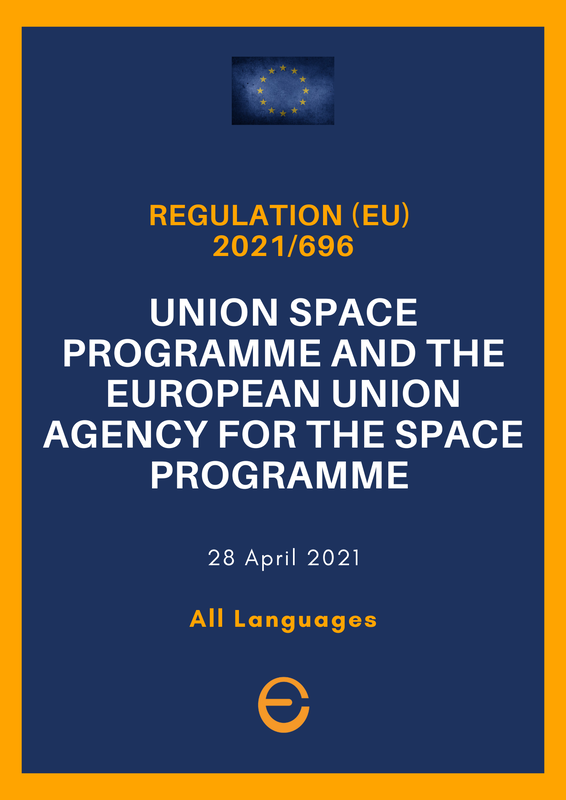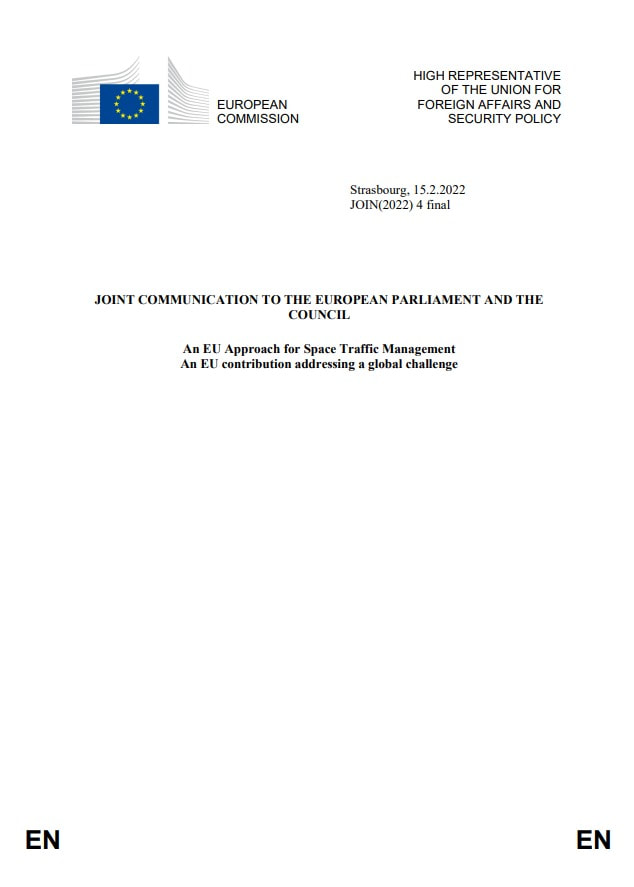|
Brussels, |
|
EU Committment
The EU is committed to developing European space capabilities through the European Space Programme and more scientific activities through Horizon Europe.
The European Space Programme helps citizens of the European Union carry out their daily activities on earth. The satellites that the EU sends into orbit enable millions of people to communicate using new technologies, to travel by land, sea and air and to develop ways to improve the health of our planet.
Horizon Europe - Cluster on Digital, Industry and Space offers support to research activities that support European space policy.
EU space policy:
According to research carried out by the European Commission, the European space economy, which includes manufacturing and services, employs over 231 000 professionals. Its value was estimated at around €53-62 billion in 2017.
The European Space Programme helps citizens of the European Union carry out their daily activities on earth. The satellites that the EU sends into orbit enable millions of people to communicate using new technologies, to travel by land, sea and air and to develop ways to improve the health of our planet.
Horizon Europe - Cluster on Digital, Industry and Space offers support to research activities that support European space policy.
EU space policy:
- helps create jobs and boost growth and investment in Europe
- pushes back the boundaries of science and research
- promotes and facilitates other policies in such areas as security and defence, industry and digital technology
- plays a crucial role in the economic recovery after the COVID-19 crisis and in tackling global challenges such as climate change
According to research carried out by the European Commission, the European space economy, which includes manufacturing and services, employs over 231 000 professionals. Its value was estimated at around €53-62 billion in 2017.
EU Space Programme 2021-2027
|
In April 2021, the Council and European Parliament adopted a regulation establishing the new EU space programme for the years 2021 to 2027.
It will ensure:
The regulation simplifies the existing EU legal framework and governance system and standardises the security framework. It improves and brings together existing EU programmes such as Copernicus, Galileo and EGNOS under one umbrella. The programme also introduces new security components, such as the Space and Situational Awareness (SSA) programme or the new Governmental Satellite Communication (GOVSATCOM) initiative to monitor space hazards and provide national authorities with access to secure satellite communications. |
|
While striving to strengthen existing European space assets and services, EU Space Programme also target start-ups and SMEs, which develop innovative solutions based on space technologies, data and services. The EU Space Programme supports the European space industry and promotes the emergence of a European ‘New Space’ eco-system fostering entrepreneurship, innovation and new funding opportunities.
Today, EU Space Programme is dealing with:
The EU Space Programme is implemented in close cooperation with the EU Member States, the European Union Agency for the Space Programme (EUSPA), the European Space Agency (ESA), EUMETSAT and many other stakeholders. The Programme's main targets are decision-makers, public authorities, EU commercial and private users and others, such as researchers and nongovernmental organisations. Ultimately, the programme serves the needs of EU citizens. The information gathered by the EU-owned satellites and the services which they provide are a public good, freely accessible to all. The following flagship current and future components deliver European space-based services on a daily basis:
|
|
Space research activities
The research activities are mainly grouped in Horizon Europe - Cluster on Digital, Industry and Space.
Europe promotes research activities to equip European industry with competitive and reliable technologies, acquiring global leadership in key areas, maximizing benefits for all of society while respecting the environment.
Europe promotes research activities to equip European industry with competitive and reliable technologies, acquiring global leadership in key areas, maximizing benefits for all of society while respecting the environment.
EUSPA - The EU Agency for Space Programme
The European Union Agency for the Space Programme (EUSPA) plays a crucial role in ensuring the safety and security of European satellite navigation services.
EUSPA also actively promotes the commercialization of Galileo, EGNOS, and Copernicus data and services, along with its involvement in secure satellite communications through GOVSATCOM and IRIS2.
Furthermore, EUSPA manages the EUSST Front Desk and is tasked with accrediting the security of all EU Space Programme components.
EUSPA's commitment to fostering innovation in the space sector, fostering collaboration within the EU Space community, and contributing to the European Green Deal and digital transition, all serve to enhance Union safety and security while strengthening autonomy and resilience.
EUSPA also actively promotes the commercialization of Galileo, EGNOS, and Copernicus data and services, along with its involvement in secure satellite communications through GOVSATCOM and IRIS2.
Furthermore, EUSPA manages the EUSST Front Desk and is tasked with accrediting the security of all EU Space Programme components.
EUSPA's commitment to fostering innovation in the space sector, fostering collaboration within the EU Space community, and contributing to the European Green Deal and digital transition, all serve to enhance Union safety and security while strengthening autonomy and resilience.
EUSPA's Mission
The European Union Agency for the Space Programme (EUSPA) is an instrumental organization with a clear mission defined by the EU Space Programme Regulation (see above).
EUSPA operates as the user-oriented operational agency of the EU Space Programme, committed to fostering sustainable growth, enhancing security, and ensuring the safety of the European Union.
EUSPA has forged robust partnerships with key entities, including the European Commission, European Parliament, Member States, the European Space Agency, and private actors throughout the EU.
EUSPA is responsible for executing a multi-faceted mission:
Through these strategic actions and partnerships, EUSPA makes also an important contribution to the European Green Deal, the digital transition, the overall safety and security of the European Union, and the reinforcement of its autonomy and resilience.
EUSPA operates as the user-oriented operational agency of the EU Space Programme, committed to fostering sustainable growth, enhancing security, and ensuring the safety of the European Union.
EUSPA has forged robust partnerships with key entities, including the European Commission, European Parliament, Member States, the European Space Agency, and private actors throughout the EU.
EUSPA is responsible for executing a multi-faceted mission:
- Advanced Service Provision: EUSPA delivers state-of-the-art, secure positioning, navigation, and timing services based on Galileo and EGNOS. Additionally, it offers cost-effective satellite communication services through GOVSATCOM and will soon introduce IRIS2. EUSPA also oversees the Front Desk services of the EU Space Surveillance Tracking, ensuring the continuous operation and robustness of these systems.
- Maximizing Data and Services: EUSPA actively promotes and maximizes the use of data and services provided by Galileo, EGNOS, Copernicus, GOVSATCOM, and soon, IRIS2 across a wide range of domains.
- Fostering the European Space Ecosystem: EUSPA plays a pivotal role in fostering the development of a vibrant European space ecosystem. It provides market intelligence and technical expertise to innovators, academia, start-ups, and SMEs, leveraging Horizon Europe, other EU funding mechanisms, and innovative procurement approaches.
- Security of EU Space Programme Components: EUSPA takes on the responsibility of implementing and monitoring the security of the EU Space Programme components, both in space and on the ground. The aim is to enhance the security of the Union and its Member States, with EUSPA operating the Galileo Service Monitoring Centre.
- EU Space Programme Security Accreditation: EUSPA establishes the EU Space Programme Security Accreditation Board within the Agency, serving as the security accreditation authority for all EU Space Programme components.
Through these strategic actions and partnerships, EUSPA makes also an important contribution to the European Green Deal, the digital transition, the overall safety and security of the European Union, and the reinforcement of its autonomy and resilience.
Source: European Union, http://www.europa.eu/, 1998-2024
|
Brussels - Milano - Nice - Tokyo
|
eEuropa Belgium
Avenue Louise, 367 1050 Brussels BELGIUM Bld. Franck Pilatte, 19 bis
06300 Nice FRANCE YONO HOUSE 9-1 KAMIOCHIAI, SAITAMA-SHI, SAITAMA-KEN 〒 338-0001 JAPAN Via S. Veniero 6 20148 Milano ITALY |
All rights reserved - © Copyright eEuropa Belgium 2020-2024






